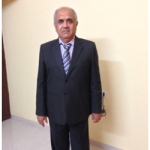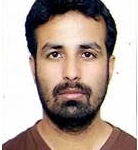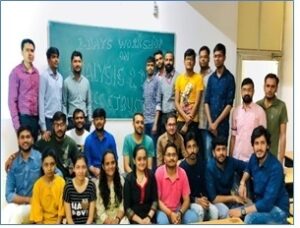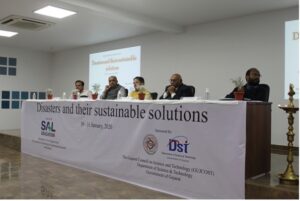- About Department
- Vision and Mission
- Academic Curriculum
- Laboratories
- Faculties
- Students Achievements
- News and Events
- Innovation in Teaching & Learning
- Newsletter
Department of Civil Engineering
Infrastructure is the backbone of any country’s development. The population of the world is increasing day by day and the technology is becoming more advanced. The need for better infrastructural facilities like buildings, transportation, power, health and hygiene is growing across the world and it should be in pace with the increasing population and their needs. In India, there has been a steady increase in the urban population on account of rapid industrialization, natural growth and migration from rural areas. This has prompted the working out of alternative ways of meeting the increasing demand of infrastructural facilities like roads and buildings, industrial complexes, commercial buildings, godowns, bridges and many civil projects.
Indian infrastructure has been given a boost through implementation of various initiatives such as building Golden Quadrilateral, increased Power plant capacity, building power grid across India and better airports .A huge demand for civil engineers can be anticipated from the new government’s initiative to encourage infrastructure on every level, whether it is roads, rails, bridges, building commercial or residential, airport, etc.etc. which are must for civilization.
Civil engineering is a professional engineering discipline that deals with the design, construction and maintenance of the physical and naturally built environment, including works like roads, bridges, canals, dams, and buildings. Civil engineering is the second oldest engineering discipline after military engineering, and it is defined to distinguish non military engineering from military engineering. It is traditionally broken into several sub-disciplines including architectural engineering, environmental engineering, geotechnical engineering, structural engineering, earthquake engineering, transportation engineering, forensic engineering, municipal or urban engineering, water resources engineering, materials engineering, wastewater engineering, offshore engineering, aerospace engineering, quantity surveying, coastal engineering, construction surveying and construction engineering. Civil engineering takes place in the public sector from municipal through to national governments and in the private sector from individual homeowners through to international companies.
The Department offers a four-year course leading to the Bachelor Degree in Civil Engineering. Civil engineering degree graduates are the brains behind all the largest and most essential structures that surround us – buildings, transport networks, energy and water supplies and so their value within society is great. The laboratories of the Department are well equipped. The theoretical courses are supplemented by imparting practical experience through well-equipped laboratories. The labs here are Surveying, Fluid Mechanics, Mechanics of Solids and Applied Geology.
Vision
“To achieve Excellence in Technology, Innovation and Research in ethical way to Lead and Serve the Nation”Mission
1. Create and develop sustained environment of learning.2. To produce high caliber and dynamic Civil Engineers with due consideration of Economy, Ecology and Ethical issues of nation. 3. To provide highly competent Civil Engineers to society and construction industry.
4. To assist in developing nation capabilities globally with respect to Science, Technology and Research.
Program Educational Objectives (PEOs)
Civil Engineering program aims to develop versatile professionals who can excel in a variety of career environments. Program Educational Objectives are broad statements that describe the career and professional accomplishments that the program is preparing graduates to achieve in 3 to 5 years after graduation. The Program Educational Objectives of B.E. (Civil Engineering) program is:
PEO 1:
Graduates will able to apply fundamental principles of science, mathematics and engineering using modern tools to solve the societal and environmental problems.PEO 2:
Graduates are able to use their practical, field survey, computer and analytic skills to build industry ready engineers to solve multi-disciplinary sustainable projects.PEO 3:
Graduate applies innovative ideas to improve the technical competency in engineering decisions, lifelong learning, to equip leadership qualities in diverse teams, promote and practice appropriate ethical moral to become professional engineers.2. 3110014 - Mathematics-I
3. 3110002 - English
4. 3110012 - Workshop
5. 3110003 - Programming for Problem Solving
6. 3110004 - Basic Civil Engineering
See the Syllabus here
2. 3110005 - Basic of Electrical Engineering
3. 3110007 - Environment Studies
4. 3110015 - Mathematics-II
5. 3110003 - Physics - I
See the Syllabus here
2. 3130007 - Indian Constitution
3. 3130008 - Design Engineering - I A
4. 3130606 - Geotechnical Engineering
5. 3130607 - Building Construction Technology
6. 3130608 - Mechanics of Solids
7. 3130609 - Building and Town Planning
2. 3140601 - Surveying
3. 3140603 - Structural Analysis-I
4. 3140609 - Civil Engineering - Societal & Global Impact
5. 3140610 - Complex Variables and Partial Differential Equations
6. 3140611 - Fluid Mechanics & Hydraulics
2. 3150004 - Contributor Personality Development Program
3. 3150005 - Integrated Personality Development Course
4. 3150610 - Concrete Technology
5. 3150611 - Transportation Engineering
6. 3150612 - Design of Structures
7. 3150613 - Pavement Design and Highway construction
8. 3150614 - Structural analysis-II
9. 3150615 - Soil Mechanics
10. 3150616 - Pipeline Engineering
11. 3150617 - Remote Sensing and GIS
12. 3150618 - Python Programming
13. 3150612 - Design of Structures
2. 3160002 - Contributor Personality Development Program
3. 3160003 - Integrated Personality Development Course
4. 3160608 - Urban Transportation Planning
5. 3160610 - Water Resources Engineering and Hydrology
6. 3160611 - Environmental Engineering
7. 3160612 - Design of Reinforced Concrete structures
8. 3160613 - Rock Mechanics and Tunneling
9. 3160614 - Contracts Management
10. 3160615 - Traffic Engineering and Management
11. 3160616 - Foundation Engineering
12. 3160617 - Construction Equipment and Automation
13. 3160618 - Open Channel flow
14. 3160619 - Soft Computing Techniques
15. 3160620 - Instrumentation and Sensors
16. 3160621 - Earthquake Engineering
2. 3170609 - Irrigation Engineering
3. 3170614 - Construction Engineering and Management
4. 3170615 - Engineering Economics, Estimation and Costing
5. 3170616 - Retrofitting of structures
6. 3170617 - Application of GIS in Civil Engineering
7. 3170618 - Design of Steel Structures
8. 3170619 - Railway and Airport Engineering
9. 3170620 - Computational Geotechnics
10. 3170621 - Design of hydraulic structures
11. 3170622 - Precast Construction
12. 3170623 - Port and Harbour Engineering
13. 3170624 - Design of Prestressed Concrete structures
14. 3170625 - Environmental Impact Assessment
15. 3170626 - Design of Industrial Structures
16. 3170627 - ICT For Development
17. 3170628 - Infrastructure for smart Cities
The department of civil engineering has set up a continuing education programs in different semester to train and upgrade the students to fulfill industrial needs.
Some of the feathers of continuing education are mentioned below:
-
Measurement/ Quantification Skill Development
-
Planning and Drawing Understanding
-
Basic Training: Construction Supervision
-
Engaging Students to Live Projects

















Dilip Prajapati has occupied his 1st position in state level Boxing Competition and now he is a participant at AIU.

Gami Kanti Dinesh is Champion in Kho-Kho Event Organised by GTU

Raval Alay got Silver Medal in Volley Ball Competition.
Our Newsletters
Our Events
Innovation in Teaching & Learning
| Sr No | Newsletter | Download |
|---|---|---|
| 1 | Newsletter-2023-Civil-Issue-5 | Click Here |
| 2 | Newsletter-2023-Civil-Issue-6 | Click Here |

















